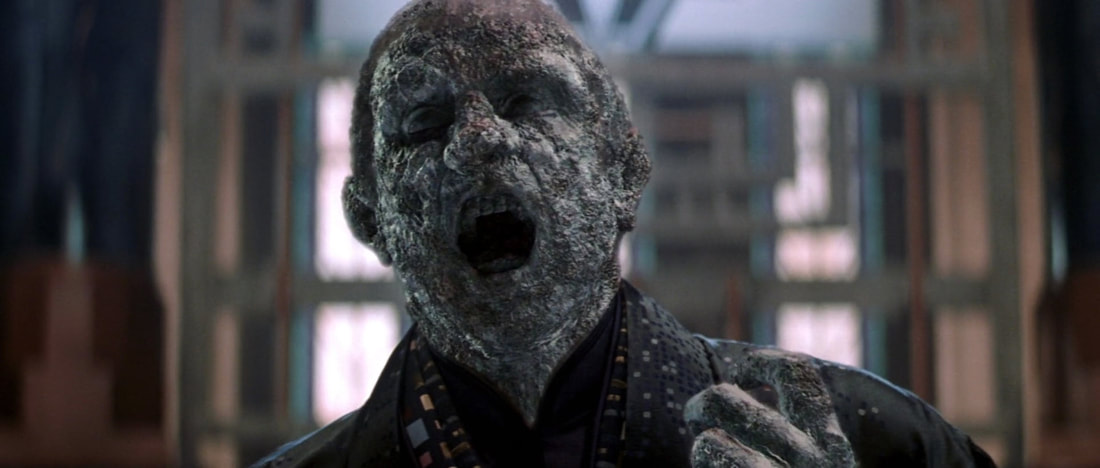On Ash Wednesday, those of us who participate in the traditional liturgy will hear these words (or some version thereof), "Dust you are. To dust you will return." It's an awfully morbid feeling to hear those words, especially when spoken while your pastor or priest smudges ashes on your forehead--and especially for someone like me who did not grow up with this tradition. Why would a minister who constantly encourages, challenges, and affirms my humanity and my soul want to tell me I'm dust?
It certainly is a contemplation of physical mortality. But the fact that it occurs in a context that is intended to nurture the soul points to a dual purpose.
There are two things the "dust you are" line always remind me of. One is Star Trek: Nemesis. I know it's not everyone's favorite Trek film, but stay with me. In the opening scene, we witness the assassination of the entire Romulan High Command by means of thalaron radiation. As the radiation is released, within seconds, members of the High Command begin disintegrating and we watch as the are reduced to dust.
The scene sets up the central question of the film: Are we merely bodies or are we more than the sum of our DNA? This horrifying image--perhaps the most gruesome in Star Trek to that point--of people in agony, turning to dust, speaks to the frailty of physical form. Undo the DNA and a whole person is no more. Dust.
However, the film ultimately affirms the idea that we are indeed more than our physical makeup. Picard's central crisis in the film is, essentially, a crisis of the soul. Is he defined by his genetic makeup or is there something more to his existence? If so, what is it?
The other thing I'm reminded of is a line from Henry Wadsworth Longfellow, "Dust thou art . . ." It comes from the poem "A Psalm of Life," in which Longfellow explores this tension between the temporary and fleeting nature of our existence and our desire to live for more than mere survival.
It certainly is a contemplation of physical mortality. But the fact that it occurs in a context that is intended to nurture the soul points to a dual purpose.
There are two things the "dust you are" line always remind me of. One is Star Trek: Nemesis. I know it's not everyone's favorite Trek film, but stay with me. In the opening scene, we witness the assassination of the entire Romulan High Command by means of thalaron radiation. As the radiation is released, within seconds, members of the High Command begin disintegrating and we watch as the are reduced to dust.
The scene sets up the central question of the film: Are we merely bodies or are we more than the sum of our DNA? This horrifying image--perhaps the most gruesome in Star Trek to that point--of people in agony, turning to dust, speaks to the frailty of physical form. Undo the DNA and a whole person is no more. Dust.
However, the film ultimately affirms the idea that we are indeed more than our physical makeup. Picard's central crisis in the film is, essentially, a crisis of the soul. Is he defined by his genetic makeup or is there something more to his existence? If so, what is it?
The other thing I'm reminded of is a line from Henry Wadsworth Longfellow, "Dust thou art . . ." It comes from the poem "A Psalm of Life," in which Longfellow explores this tension between the temporary and fleeting nature of our existence and our desire to live for more than mere survival.
|
Tell me not, in mournful numbers, “Life is but an empty dream!”
For the soul is dead that slumbers, And things are not what they seem. Life is real! Life is earnest! And the grave is not its goal; “Dust thou art, to dust returnest," Was not spoken of the soul. Not enjoyment, and not sorrow, Is our destined end or way; But to act, that each to-morrow Finds us farther than to-day. Art is long, and Time is fleeting, And our hearts, though stout and brave, Still, like muffled drums, are beating Funeral marches to the grave. In the world’s broad field of battle, In the bivouac of Life, Be not like dumb, driven cattle! Be a hero in the strife! Trust no Future, howe’er pleasant! Let the dead Past bury its dead! Act,--act in the living Present! Heart within, and God o’erhead! Lives of great men all remind us We can make our lives sublime, And, departing, leave behind us Footprints on the sands of time; Footprints, that perhaps another, Sailing o’er life’s solemn main, A forlorn and shipwrecked brother, Seeing, shall take heart again. Let us, then, be up and doing, With a heart for any fate; Still achieving, still pursuing Learn to labor and to wait. |
As the season of Lent begins, it is helpful to remember that our mortality need not be morbid. Instead, as Longfellow illustrates, contemplation of our mortality ought to lead us to action. The grave, indeed, is not the goal. But neither is the goal what lies beyond the grave. Instead, the life we live now is our calling and our investment. Remembering that it doesn't last should call us to pursue it ever more fully because therein lies the nurturing of our souls.
Watch the video below for more on Star Trek and the soul.


 RSS Feed
RSS Feed
